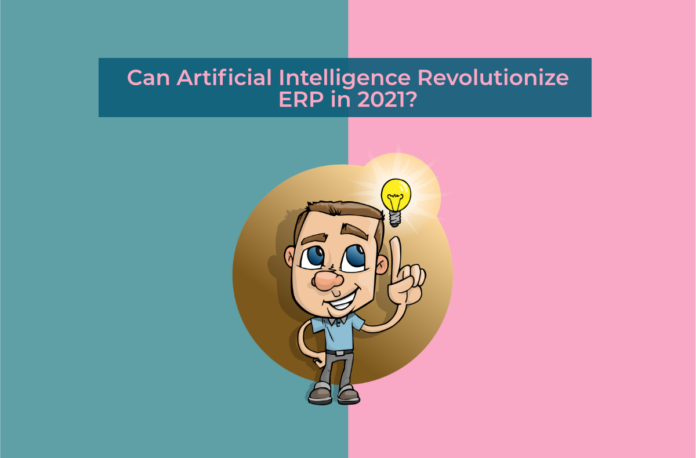According to a PwC’s Global CEO Survey, 85% of CEOs believe that artificial intelligence or AI-driven ERP will massively impact organizations and their business models in the next five years.
What is an ERP system?
An enterprise resource planning (ERP) system helps companies in managing their everyday business activities in different fields comprising operations (supply chain management and planning, inventory management), finance (financial analysis, procurement, accounting), and human resource management (workforce planning and management).
The ERP software functions as a business asset because it helps simplify the monitoring of the entire project resources involved there and process of an interdependent and interconnected business.
For example, ERP software helps in:
- Connecting a large number of business processes and allowing data flow between them.
- Collecting data from various sources of the business and creating a common database
All companies can trust the database to access the latest, exact data since each stakeholder keeps creating, using, collecting the same data gained from the central data archive.
Who are the ERP adopters?
The ERP systems are adopted by all sizes of ‘businesses of industries’ who want to manage their various kinds of enterprise resources.
Some major ERP adopters are as under:
- Healthcare, distribution & construction industries
- Companies of professional & industrial services
- Consulting firms or independent consultants
- Manufacturing companies
- Software vendors
Which artificial intelligence technologies are relevant to ERP systems?
Machine Learning (ML)
A machine learning (ML)-based ERP helps benefiting companies through the following:
- Predictive analytics: This means the software helps with much more accurate forecasts.
- Root cause analysis: The software helps in detecting and analyzing the root cause of the decline.
- Optimization: By optimizing production that leads to minimal material consumption or higher quality output, the yield rates increase at the machine, production cell, or plant level.
Virtual agents: Agents acquainted with AI strengths help in providing an easy-to-use UI to ERP systems that aren’t supposed to be user-friendly.
What are AI use-cases in ERP?
Generally, artificial intelligence or AI models help enterprises in reducing costs and improving operations.
Examples are:
Advanced Analytics & Forecasting
Most operations tasks including supply chain management & production can immensely benefit from exact predictions. Artificial intelligence or AI-driven components help in improving predictions leveraging existing conditions and historical data.
More specific applications include:
Production: Better management of seasonality to evade overproduction or underproduction.
Warehouse Management: BMW leverages learning algorithms to keep track of an item right from the manufacturing stage to when it is sold, this way, keeping track of 31 assembly lines in various nations.
Sales: The more highly detailed analysis of sales the much better predictions. This converts to better targets and enhance employee performance
Human resources
Most ERP systems help when it comes to providing basic HR functionality.
But, higher analytics capabilities allow firms to improve performance management.
IT & finance/accounting
AI impacts the enterprise on their back-office tasks of IT and finance/accounting.
Particularly, artificial intelligence (AI), in financial management, can help in:
- Verifying the accuracy of statements and reports
- Increasing efficiency of transaction-processing
- Automating repetitive accounting functions
Customer service
Artificial intelligence or AI-driven ERP enables faster, affordable, and consistent service. A well-known advantage is chatbots that help in instantly answering customers’ common inquiries.
This way, customer service representatives are able to deal with more intricate customer queries.
What is the level of interest in integrating artificial intelligence in ERP systems?
According to an IDC estimate, by 2021, a fifth of the Forbes global 2000 manufacturers are likely to take advantage of the Internet of Things (IoT), blockchain, and cognitive (artificial intelligence (AI) as well as machine learning (ML) to automate the large-scale processes.
Impact from intelligent or AI-based ERP was likely to be an essential KPI by 15% of G2000.
What challenges organizations face in using artificial intelligence technologies in ERP?
Data quality: Machine learning (ML) forecasts are as precise as the data quality of their training data.
Data collection: Many ERP programs allow for certain specific functions.
This helps them in collecting only a small amount of enterprise data that restricts training data for AI models.
A recent survey among more than 263 IT leaders reveals the following facts:
- 94% of organizations leverage not more than 80% of the features in their ERP system
- Over 33% take advantage of not more than 30% of the features
Major ERP software with AI capabilities
Some vendors claiming certain enhancements in their ERP solution due to ML are:
- NetSuite Intelligent Cloud Suite
- Microsoft Dynamics AI
- SAP S/4HANA Cloud
- Infor Coleman
- Epicor EVA
- SYSPRO
How to evaluate modern ERP systems in line with advances in AI?
Machine learning (ML) has no crucial role when it comes to ERP selection.
Organizations need to choose ERP systems considering how they are going to benefit them while managing their daily business activities.
However, the features discussed below are important to ascertain that the ERP program or ERP software is future-ready for machine learning:
Effective data management
Organizations hardly want to revolutionize their ERP systems since these are crucial production systems that companies have integrated into their operations.
Therefore, companies ensure that when they adopt a new ERP system, it helps in storing and providing organization data in great detail, in tandem with the company’s operations.
As long as data is easily accessible, organizations can leverage ML modules of their ERP or other programs to create ML models to resolve their operational issues.
Ease of integration
No single company should claim to be the machine learning software provider since ML impacts every aspect of a company’s operations.
Ideal ERP software should be easy to integrate for 3rd party providers.
After reading the article about “Can Artificial Intelligence Revolutionize ERP in 2021?”, we hope that you would like to know more about the AI & ERP consultants who can best guide you in this regard.
If you have any questions about which ERP software you need to purchase and use or can help you get more benefits from your business, we would be happy to answer them in the comment section below.



